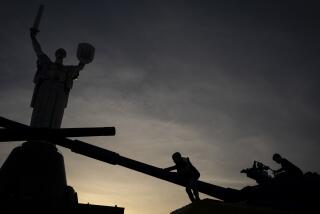U.S. Admits It Underestimated Threat to Kurds
- Share via
WASHINGTON — In the Bush Administration’s first explicit acknowledgement that it may have misjudged the aftermath of the Persian Gulf War, National Security Adviser Brent Scowcroft admitted Sunday that Iraq’s brutal attack against the Kurds took the White House by surprise.
“We did anticipate that there would be a lot of chaos and that the winning of the war would not solve the problems of that region by any stretch of the imagination,” Scowcroft said on ABC’s “This Week With David Brinkley.”
But he added: “One of the things perhaps we did not anticipate was the severity of (Iraqi President) Saddam Hussein’s attack against the Kurds, with possibly the intention of solving his Kurdish problem by driving them out.”
The tragedy has cast a shadow over the stunning allied victory against Iraq. The coalition forces stopped short of overthrowing Hussein, thus leaving in place a leader whom President Bush repeatedly compared to Adolf Hitler.
Bush had urged the people of Iraq to rise up against Hussein, but when the Kurds attempted a rebellion, it was quickly crushed by Hussein’s superior forces. In recent weeks, up to 1.2 million refugees--many of them starving--are believed to have fled Iraq for Iran and Turkey.
The Administration has come under increasing criticism for having been too slow in responding to the Kurdish crisis, and Bush’s approval rating has plunged from where it was just after the war ended.
Scowcroft noted Sunday that the United States had stocked some border areas with refugee supplies. “What we could have done is, perhaps, pre-positioned more supplies in Turkey,” he said.
But he asserted that given the harshness of the terrain, “It is hard for the people to survive now at those altitudes.
“We could, perhaps, have marginally improved that--but only marginally,” he admitted.
Last week, the Administration warned Iraq not to mount military operations north of the 36th Parallel, so that Kurdish refugees could have a “safe haven” in that large portion of northern Iraq. Nonetheless, there have been reports of continued fighting in that area.
Scowcroft suggested that this fighting would not draw U.S. retaliation because it involves Iraqi troops pitted against Kurdish armed forces, rather than Iraqis attacking Kurdish refugees.
Meanwhile, complaints about Bush’s performance in the wake of the U.S.-led Gulf War victory continued to mount. “I think the Administration has failed,” said California Rep. Tom Lantos (D-San Mateo), chairman of the Congressional Human Rights Caucus.
By spearheading the effort to provide emergency aid to the refugees, the Administration “is now attempting to recapture the moral high ground,” Lantos said on CNN’s “Newsmaker Sunday.”
“It is not too late, but unfortunately, hundreds--if not thousands--will have died,” he said.
Also appearing on the Brinkley show, Israeli Housing Minister Ariel Sharon declared that the allies left Hussein with too much power. “When I see the way he controls Iraq now, I’m very much afraid that it will be a very short time until he will become again the main danger to the Middle East,” Sharon said.
However, Scowcroft insisted that it would have been a mistake to carry the war further to remove Hussein from power. “That would have changed the whole character of the situation,” he said.
Defense Secretary Dick Cheney also defended the Bush Administration’s decision to limit its Gulf War aims to liberating Kuwait from Iraqi occupation.
“We have repeatedly said that the question about who governs in Iraq and what structure there is inside Iraq is something that is going to have to be decided by the Iraqi people,” Cheney said on NBC’s “Meet the Press.”
The defense secretary also predicted that Hussein will not survive politically and speculated that “what he has done to his country is probably deeply resented by many of the commanders in the (Iraqi) army.”
However, Iraq’s military so far has shown little inclination to oppose the Iraqi president; in fact, it put down his opponents with devastating ferocity.
The Administration has portrayed the uprisings as an internal dispute. Speaking at Maxwell Air Force Base in Alabama on Saturday, President Bush declared that he would not allow “one single soldier or airman to be shoved into a civil war in Iraq that’s been going on for ages.”
The statement implied that U.S. intervention in such a situation could turn out to be a political morass similar to that of the Vietnam War.
But Lantos called that position “phony and hypocritical.”
“There is a difference between being involved in a civil war in Iraq--which we certainly oppose--and doing nothing, which is what the Administration did in the early period of this refugee crisis,” Lantos said.
Hoshyar Zebari, a spokesman for the Kurdish Democratic Party, agreed. Speaking on the ABC program, Zebari said that the United States has a “moral responsibility” to come to the aid of the Kurds.
“Our people back in Iraqi Kurdistan . . . tell us that the United States is not serious at all, and the argument had been put in a very confused way . . . either military intervention or nothing,” Zebari said.
“I think there is a great deal in between which the United States could do.”
More to Read
Sign up for Essential California
The most important California stories and recommendations in your inbox every morning.
You may occasionally receive promotional content from the Los Angeles Times.













